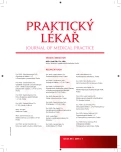-
Medical journals
- Career
Patient’s stress in hospital, disposition, empathy
Authors: F. Irmiš
Authors‘ workplace: Psychiatrie a psychosomatika, Praha
Published in: Prakt. Lék. 2016; 96(1): 5-8
Category: Reviews
Overview
The article describes the stressful situations during the patient’s hospitalization, which are often not systematically addressed. They refer to various misunderstandings between patients themselves, the nurse or doctor. They are also dependent on their experience, personality and temperament. There are conflicts concerning letting television, which may disturb someone. Also, a longer window opening may become conflicting for significant individual differences in sensitivity to cold. Temperature control in the room often depends on the spontaneous attitudes of doctors, nurses, and cleaners. Chief physicians during patient rounds may not ask patient to describe his/her troubles, which have been omitted due to a difference of houseman’s opinion about the diagnosis, which are of importance to refine testing. Diagnostic errors may occur, particularly for latent atypical, psychosomatic illnesses and in vague objective findings. Attention is drawn to inaccuracies in the distribution of medicine. A patient who feels physician’s empathy heals better. Without it leads to dehumanization, reducing the patient’s personality or deindividuation and “labelling” diagnosis. Dehumanization is increased by lack of time, progress in technology, obedience to authority, and adherence to a particular professional group. Doctors and nurses, who have suffered a serious illness, may professionally alert to negative situations.
Keywords:
patient’s stress – communication in the hospital – disposition – empathy – dehumanization
Sources
1. Bobek K, a kol. Omyly a chyby v rozpoznávání vnitřních chorob. Praha: Státní zdravotnické nakladatelství 1965.
2. Darlej JM, Batson CD. From Jerusalem to Jericho. A study of situational and dispositional variables in helping behaviour. J Pers Soc Psychol 1973; 27 : 100–108.
3. Francová V, Hnilica K. Empatie v lékařské etice. In Ptáček R, Bartůněk P, a kol. Etické problémy medicíny na prahu 21. století. Praha: Grada Publisching 2014; 401–410.
4. Friedman M, Rossenman RH. Type A behaviour and our heart. New York: Knopf 1974.
5. Haney C, Banks C, Zimbardo PG. Interpersonal dynamics in a simulated prison. Inter J Criminal Penol 1973; 1 : 69–97.
6. Irmiš F. Temperament a autonomní nervový systém. Diagnostika, psychosomatika, konstituce, psychofyziologie. Praha: Galén 2007.
7. Irmiš F. Stres mezi lékařem, pacientem a zdravou osobou. Příklady, příčiny, psychosomatika, etika. Praha: Galén 2014.
8. Irmiš F. Role temperamentu v psychoterapii, rodině a komunikaci. Psych@som 2008; 6(3): 116–124. Dostupný z: http://www.lirtaps.cz/psychosomatika/Psomweb2008_3/irmis_308.htm.
9. Kirch W, a kol. Chybné diagnózy ve vnitřním lékařství. Martin: Osveta 1995.
10. Lampert H. Die Reaktionstypenlehre und ihre Bedeutung und Klimatologie. Arch phys ther 1962; 14 : 3–10.
11. Laneová, MO. Jste introvert? Jak prosperovat ve světě extrovertů. Praha: Ikar 2006.
12. Ptáček R, Bartůněk P, a kol. Etické problémy na prahu 21. století. Praha: Grada Publishing 2014.
13. Smetáčková I, Barakzihyová T, Francová V, Hnilica K. Dehumanizace v medicíně: rizika a přínosy. In Ptáček R, Bartůněk P, a kol. Etické problémy medicíny na prahu 21. století. Praha: Grada Publishing 2014; 483–493.
Labels
General practitioner for children and adolescents General practitioner for adults
Article was published inGeneral Practitioner

2016 Issue 1-
All articles in this issue
- Patient’s stress in hospital, disposition, empathy
- Process of age-related decline of brain function among non-smokers and smokers
- Principles of person-centred health care
- Effect of selenium nanoparticles on pathogenic bacterial cultures and yeasts
- Consequentialism, deontologism, and medical ethics
- Vocational training to care for grieving parents
- General Practitioner
- Journal archive
- Current issue
- Online only
- About the journal
Most read in this issue- Consequentialism, deontologism, and medical ethics
- Principles of person-centred health care
- Patient’s stress in hospital, disposition, empathy
- Process of age-related decline of brain function among non-smokers and smokers
Login#ADS_BOTTOM_SCRIPTS#Forgotten passwordEnter the email address that you registered with. We will send you instructions on how to set a new password.
- Career

